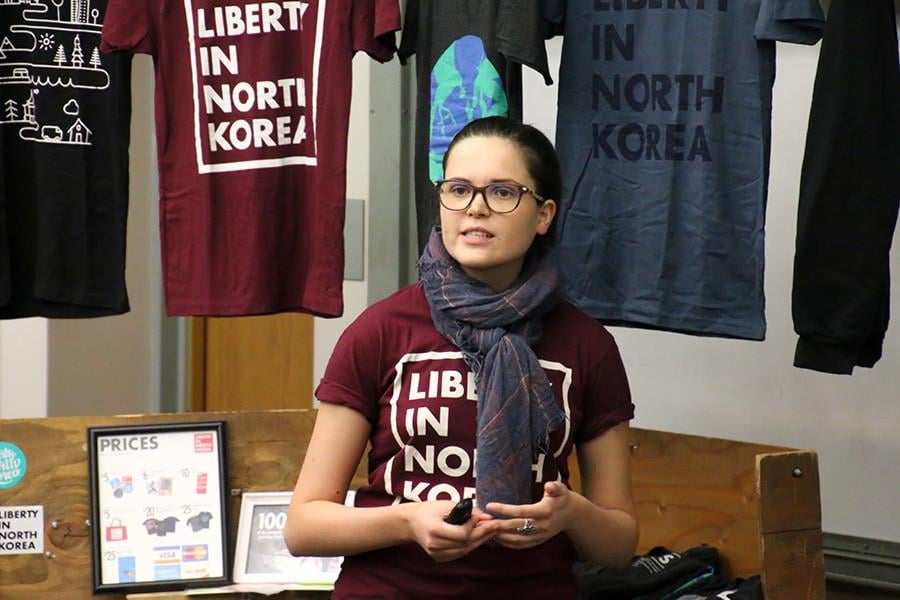Korean student groups discuss North Korean refugee crisis
Drew Gerber/ The Daily Northwestern
Anca Iordache, a Liberty in North Korea intern, speaks about the challenges North Korean refugees face today. KASA and APAC invited LiNK to celebrate Korea Peace Day, an annual event that focuses on discussing pressing issues in Korea.
October 16, 2015
Non-profit organization Liberty in North Korea celebrated Korea Peace Day with Northwestern students on Thursday, expounding on the trials North Korean refugees face throughout their escape from the totalitarian nation’s borders.
Korean American Student Association and Asian Pacific American Coalition collaborate each year on Korea Peace Day to raise awareness of pressing issues in Korea. This year, the two student organizations brought LiNK, which focuses on North Korean refugees and helps them escape the country and arrive safely at other countries such as South Korea or the United States. The presenters showed the audience a documentary, in which the refugees attested to the reality of living in oppression and their journey of escape.
During the introduction of the event, Anca Iordache, one of the interns at LiNK and the presenter of the documentary, said the focus on the Kim regime in the mainstream media diverts the attention ordinary North Korean refugees need. People often associate North Korea with its dictator and nuclear weapons, not its people, she said.
“After all, who would like to be involved in an issue that seems to be so controversial and complicated?” Iordache said.
JunGyu Kim, KASA president and Weinberg junior, said the student group chose LiNK because not many Korean Americans are aware of issues regarding North Korea, although those who live in South Korea are more aware of them due to the mandatory military service and geographical proximity to North Korea.
“(Korean Americans) are a little bit sheltered because they are not exposed to having North Korea right across the border and having to learn about all the issues,” he said.
In the documentary, the refugees said many young North Koreans receive information about foreign cultures through exchange of USB and CD’s, which contain Korean TV shows and movies. After such access, many decide to flee because they want to have the freedom to explore a wider world, according to the presentation.
“This newfound independence from the regime has also contributed to a greater desire for information from the outside world,” Iordache said.
North Koreans’ consumption of outside media, such as movies and TV shows, is instrumental in breaking away from the government’s propaganda and learning about the truth of the world outside, Iordache said.
However, the refugees face many challenges even after their escape, when they land in South Korea, such as discrimination and lack of connection, according to the documentary. As a result, the refugees often suffer from financial and emotional struggles. The perception of refugees as victims and subjects of pity also prevent them from adjusting to the new communities, Iordache said.
“Whatever they want to do, they can do it,” Iordache said. “Today, they have become the strongest agents for change that is happening in North Korea.”
With strong resilience, the refugees are speeding up the technological, economic and social changes that are happening in North Korea, as they remain in touch with families back home, Iordache said.
“It’s nice to see an organization that is trying to help the North Korean people without putting them down,” Communication senior Emelyn Barrientos said. “In a way, it is more empowerment as opposed to fear, which I think we see a lot in the U.S. media, so I enjoyed that.”
Email: [email protected]
Twitter: @jennajeeyoung


